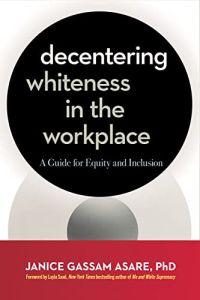Many workplaces prioritize the needs and norms of white staff members, which can result in an uncomfortable and unsafe environment for BIPOC employees. According to organizational psychologist Janice Gassam Asare, today’s leaders have a responsibility to create more equitable workplaces by “decentering whiteness.” When you decenter white voices, Gassam Asare explains, you create space for workers from marginalized backgrounds to share their experiences and perspectives. Discover how unconscious bias may be affecting your workplace culture and how to take action to trigger systemic change.
Leaders have a responsibility to create a more equitable workplace by decentering whiteness.
“White-centering” refers to prioritizing or uplifting white people or white culture over other people, communities and cultures. For example, if a Black or Indigenous individual or a person of color (BIPOC) is sharing her personal experience navigating systemic racism, someone who shifts the focus of the conversation to the indignities that some white people have experienced would be white-centering the dialogue.
White-centering is symptomatic of white supremacy, the belief that the white race is inherently superior and should dominate. However, anyone, regardless of the person’s race, can center whiteness. Racially marginalized people often engage in actions and share points of view that reinforce the dominance of white culture. In today’s workplace, white-centering can result in workplace systems – policies, processes, procedures and practices – that prioritize the needs and interests of white individuals over their BIPOC colleagues.
Historically, centering whiteness has helped protect white privilege. The notion of a white...
Janice Gassam Asare, PhD, is the founder of BWG Business Solutions, an award-winning DEI consulting firm.


















Comment on this summary